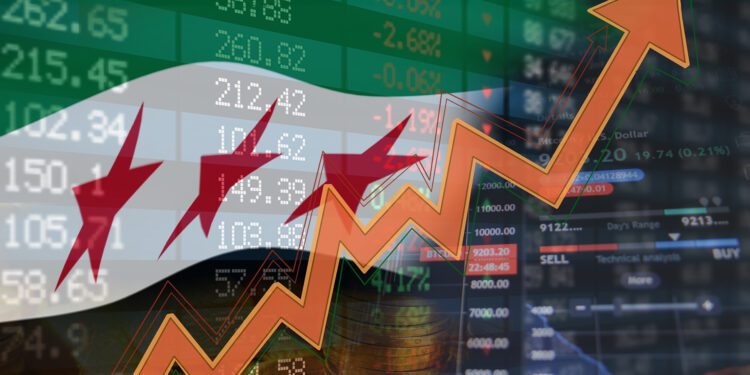In a move considered one of the most prominent indicators on upcoming transformations in the Syrian financial sector, the governor of the Central Bank of Syria, Abdel Qader Hasari, announced that the bank began to take practical steps to reactivate the global financial transfers system “Swift”, as part of official efforts to link the Syrian banking system to the international financial system, after announcing the lifting of Western sanctions on the country.
In a television interview, Hasar said that this step comes within a comprehensive plan to reintegrate the Syrian banking sector into the global economy, stressing that the bank is working to complete the technical and logistical procedures required to activate this system.
He pointed out that a remarkable international interest began to appear even before the announcement of the lifting of sanctions, as more than 50 Arab and international banks expressed his desire to open branches in Syria and invest in the local banking sector, and this reflects increasing confidence in the return of economic and financial stability.
The reactivation of the “Swift” system is a very important step for the Syrian economy, as it paves the way for facilitating external financial transfers, enhancing trade and investment movement, and opens the way for Syrian financial institutions to conduct direct and safe dealings with international banks, according to observers.
Why was “Swift” was disabled in Syria?
The arrival of the Syrian banks had been suspended in the “Swift” regime in the context of Western economic sanctions imposed on Damascus during the past years, especially after the outbreak of the Syrian revolution in 2011, and the regime used the security solution in the face of the demonstrators.
The sanctions at that time included financial and commercial restrictions aimed at isolating the Syrian regime internationally, and then led to the disruption of banks’ ability to implement international transfers or direct dealing with foreign banks.
This caused the complexity of banking operations, obstructing import and export, and increasing dependence on unofficial networks of financial transfers, and negatively affected the national economy and the private sector.
Financial and international integration
Economic analyst Yunus describes the “Swift” system as the backbone of communication between banks in the world, because it provides a reliable and transparent environment for external financial transactions.
He added that joining any bank to this system makes it internationally acceptable and safe to deal, and enhances its credibility in the global markets.
In an interview with Al -Jazeera Net, the generosity indicated that the return of Syria to the “Swift” system means the start of financial integration with the global banking system. In addition to public and private banks, the Central Bank can make international transfers, receive transfers, pay financial obligations, and obtain financing via international loans.
He explained that engaging in “Swift” is one of the indicators of the exit from economic isolation, and represents an commitment to international transparency standards, as this system allows accurate follow -up to the movement of funds, and reduces the possibilities of using the financial system in suspicious operations.
According to the generous, the presence of this system contributes to attracting foreign investments, because it reflects the state’s commitment to international standards, reassures the international companies and financiers, and it is also easy for the country to obtain aid and credit loans.
Reformers required
In light of the talk about Syria’s possible return to the global financial system “Swift”, questions arise about the economic impact of this step.
Experts believe that engaging again in the international banking system may carry great opportunities, but it remains conditional on comprehensive economic and banking reforms.
Financial and banking expert Firas Shaabu stresses that the re -linking of Syrian financial institutions to the global banking system, and the country’s return to the interface of international transactions through “Swift” is a very important step towards reintegrating Syria into the global financial system.
Shaabu explained – in an interview with Al -Jazeera Net – that this step:
- It will allow financial transfers directly, without the need for brokers or what is known as “black transfer”.
- It will reduce the cost of transfers, especially in countries such as Türkiye, Iraq and the countries of the Diaspora.
- It will speed up financial procedures and reduce risks.
- The efficiency of internal trade will improve and reduce foreign trade costs.
- It will contribute to supporting important economic aspects, most notably the increase in foreign financial flows, and the enhancement of the reserves of the Central Bank of Syria, as well as facilitating the movement of investor money.
- It will stimulate vital sectors such as industry, agriculture and trade.
He pointed out that this development will reflect positively on the work and investment environment in Syria, as investors and international companies prefer to deal with countries that have a banking system related to the global financial system, considering that this return is an indication of the beginning of Syria’s return to the “global regime’s rail”.
Despite the importance of this step, Shaabu stressed that it is not sufficient on its own to attract investments or reform the economy, explaining that what is required is to build confidence in financial institutions and restructure the economy, noting that “the ease of entering and leaving the Syrian market” is an essential element for the reassurance of investors.
Shaabu criticized the reality of the current Syrian banking sector, saying that “the most Syrian banks do not exceed 10 million dollars,” considering that “this is not enough for these institutions to prepare real banks with international standards, but hardly suitable as exchange offices.”



